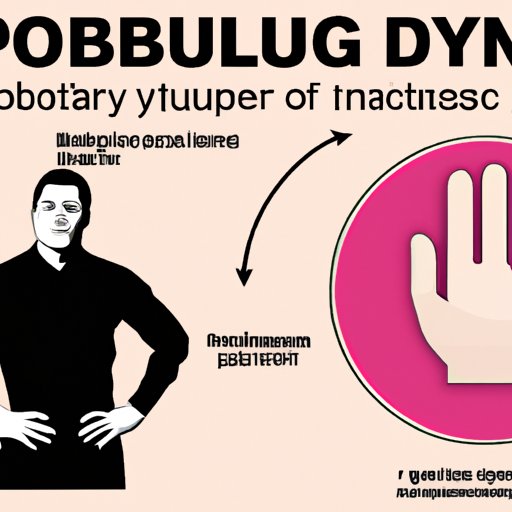Introduction
Guilt tripping is a form of emotional manipulation that can be used as a tool of emotional abuse in relationships. It involves using guilt or shame to manipulate someone into doing something they would not otherwise do. Guilt tripping can have a devastating effect on relationships, leading to feelings of insecurity, distrust, and resentment. In this article, we will explore the definition and impact of guilt tripping in emotional abuse, the long-term effects it has on relationships, how to recognize and respond to guilt tripping, the role of power dynamics in guilt tripping, and understanding the cycle of guilt tripping in emotional abuse.

Definition and Impact of Guilt Tripping in Emotional Abuse
Guilt tripping is a type of psychological warfare used in emotional abuse. It is an attempt to control someone through the use of guilt or shame. It can be used to manipulate a person into doing something they wouldn’t normally do, or to make them feel bad about themselves. Guilt tripping can take many forms, such as making subtle jabs at someone’s character, using sarcasm to belittle them, or accusing them of being selfish or ungrateful. Guilt tripping can also involve making someone feel guilty for wanting something, or for feeling a certain way.
The impact of guilt tripping in emotional abuse can be far-reaching. It can lead to feelings of insecurity, mistrust, and resentment within the relationship. It can also cause a person to question their own thoughts and beliefs, leading to a loss of self-confidence and self-worth. Furthermore, guilt tripping can create a sense of helplessness, as the victim may feel powerless to stop the abuser from manipulating them.
The Long-Term Effects of Guilt Tripping in Relationships
When guilt tripping is used in emotional abuse, the long-term effects on the relationship can be devastating. Guilt tripping can lead to a breakdown of trust between partners, as the victim may begin to doubt their own thoughts and feelings. It can also lead to feelings of resentment and anger, as the victim may feel like they are constantly being manipulated. Over time, this can cause the relationship to become strained and unhealthy.
Furthermore, guilt tripping can lead to a sense of isolation and loneliness in the victim. They may begin to feel like they have no one to turn to, and that they are completely alone in the situation. This can lead to depression and other mental health issues, as well as physical health problems. Ultimately, guilt tripping can have a profound impact on the victim’s overall well-being.
How to Recognize and Respond to Guilt Tripping
In order to protect yourself from the effects of guilt tripping in emotional abuse, it is important to recognize the signs of it. Some common signs of guilt tripping include the abuser making subtle jabs at your character, using sarcasm to belittle you, or accusing you of being selfish or ungrateful. If you find yourself feeling guilty or ashamed after an interaction with your partner, it may be a sign that they are engaging in guilt tripping.
Once you have recognized the signs of guilt tripping, it is important to develop strategies for responding to it. The best way to respond to guilt tripping is to remain calm and refuse to engage in the behavior. It is also important to set boundaries and stand your ground. If necessary, seek out professional help to learn more effective ways of dealing with guilt tripping.

The Role of Power Dynamics in Guilt Tripping
It is important to understand the role of power dynamics in guilt tripping. Guilt tripping is often used by an abuser to maintain control over their victim. This can be seen in the way they use guilt or shame to manipulate the victim into doing something they wouldn’t normally do. In some cases, the abuser may even be aware of the power imbalance in the relationship and use it to their advantage.
It is also important to recognize unhealthy power dynamics in relationships. If you find yourself in a relationship where one partner consistently uses guilt or shame to manipulate the other, it is important to seek help. It is also important to remember that no one deserves to be treated this way, and that it is possible to break free from the cycle of guilt tripping.

Understanding the Cycle of Guilt Tripping in Emotional Abuse
In abusive relationships, guilt tripping can become a vicious cycle. The abuser may use guilt or shame to manipulate their victim into doing something they don’t want to do. This can lead to feelings of insecurity, mistrust, and resentment in the victim, which in turn can lead to further manipulation. Over time, this can create a toxic dynamic in the relationship that is difficult to break.
It is important to recognize the patterns of guilt tripping in abusive relationships, and to take steps to break the cycle. This may involve seeking professional help, setting boundaries, and learning effective communication skills. It can also involve finding a support system of friends and family who can offer encouragement and understanding.
Conclusion
In conclusion, guilt tripping is a form of emotional abuse that can have devastating effects on relationships. It involves using guilt or shame to manipulate someone into doing something they would not otherwise do. Recognizing and responding to guilt tripping, understanding the role of power dynamics, and breaking the cycle of guilt tripping can be key to protecting yourself from its damaging effects.
If you are affected by guilt tripping in an emotionally abusive relationship, it is important to remember that you are not alone. There are resources available to help you better understand and cope with the situation. With the right support, it is possible to break free from the cycle of guilt tripping and reclaim your power.
(Note: Is this article not meeting your expectations? Do you have knowledge or insights to share? Unlock new opportunities and expand your reach by joining our authors team. Click Registration to join us and share your expertise with our readers.)
